DK Goel Solutions Chapter 22 Financial Statements With Adjustments
Read below DK Goel Solutions Class 11 Chapter 22 Financial Statements With Adjustments. These answers have been developed based on the latest Class 11 DK Goel Accountancy book used by commerce stream students issued for current year and the questions given in each chapter.
This chapter of DK Goel includes various value-based calculations of financial statements after proper adjustment of the data. Once you extract the financial statements, there are times when some adjustments have to be passed to reflect the true financial position of an organization.
In this chapter you will understand what these adjustments are. The chapter contains lot of questions which can be very helpful for Class 11 commerce students of Accountancy and will also help build strong concepts which will be really helpful in your career.
DK Goel Solutions Class 11 Chapter 22 solutions are free and will help you to prepare for Class 11 Accountancy. Just scroll down and read through the answers provided below
Financial Statements With Adjustments DK Goel Class 11 Accountancy Solutions
Students can refer below for solutions for all questions given in your DK Goel Accountancy Textbook for Class 11 in Chapter 22
Short Answer Questions for DK Goel Solutions Class 11 Chapter 22:
Question 1:
Solution 1: Necessity to make modifications:
- To determine the company’s actual net profit or loss.
- To assess the company’s real financial status.
- To document a transaction that has been removed from the accounts.
Entries for adjustment:- - Wages A/c
To Outstanding wages A/c
(wages due) Dr. - Salary A/c
To outstanding Salary A/c
(salary due) Dr. - Prepaid Insurance A/c
To Insurance A/c
(Insurance prepaid in advance) Dr. - Depreciation A/c
To Machinery A/c
To Furniture A/c
(Depreciation charge) Dr.
Question 2:
Solution 2: Instead of reserve, the term provision should be used when the purpose is not to improve the business’s financial position, but to compensate an anticipated potential loss.
In balance sheet:
Liabilities Amount Assets Amount
Debtors 50,000
Less: Provision for bad
and doubtful debts 2,000
48,000
Question 3:
Solution 3:
This are the costs that were accumulated during the year but were left outstanding on the day of final account planning.
Name of Accounts Dr. Balances Cr. Balances
Wages paid 2,20,000
Salary paid 55,000
Question 4:
Solution 4:
i. Accrued Income: It is quite common that certain items of income such as interest on securities, commission, rent etc., are earned during the current year but have not been actually received by the end of the current year. Such incomes are known as accrued income.
ii. Unearned Income: Certain income is received in the current year but the whole amount of it does not belong to the current year. Such portion of this income which belongs to the next year is known as unearned income.
iii. Provision for doubtful debts: such a provision is created at a fixed percentage on debtors every year and is called ‘provision for bad and doubtful debts’.
Question 5:
Solution 5:
1) Capital Expenditure: If benefit of expenditure is received for more than one year, it is called capital expenditure. Example: Purchase of Machinery.
2) Revenue Expenditure: It is the amount spent to purchase goods and services that are used during an accounting period is called revenue expenditure. For Example: Rent, interest, etc.
3) Deferred Revenue Expenditure: There are certain expenditures which are revenue in nature but benefit of which is derived over number of years. For Example: Huge Advertisement Expenditure.
Question 6:
Solution 6:
i. Purchase of machinery.
ii.Expenditure on installation of machinery.
Question 7:
Solution 7:
1) Capital Expenditure: If benefit of expenditure is received for more than one year, it is called capital expenditure. Example: Purchase of Machinery.
2) Revenue Expenditure: It is the amount spent to purchase goods and services that are used during an accounting period is called revenue expenditure. For Example: Rent, interest, etc.
Question 8:
Solution 8:
a) Assets
b) Dr. of P & L A/c
c) Assets
d) Dr. of P & L A/c
e) Liabilities.
Question 9:
Solution 9:
Adjustment Entry Treatment in P & L A/c Treatment in Balance Sheet
i. Accrued income Accrued income A/c Dr.
To Income A/c Added in income on credit side of Profit & Loss A/c Shown on the Assets side.
ii. Unearned income Income A/c Dr.
To Unearned income A/c Deducted from income on the credit side of Profit and Loss A/c Shown on the liabilities side.
Question 10:
Solution 10:
a) Outstanding Salary
Adjustment Entry:-
Salary A/c Dr.
To Outstanding Salary
Treatment in Financial Statement:-
Outstanding Salary is added to debit side of Profit and loss account and shown in the Liabilities side of balance sheet.
b) Accrued interest
Adjustment Entry:-
Accrued Interest A/c Dr.
To Interest Received A/c
Treatment in Financial Statement:-
Accrued Interest is added to on the credit side of Profit and Loss Account and shown on the Assets side of balance sheet.
Practical Questions:-
Question 1:
Solution 1:

Profit and Loss Account for the year ended March 31, 2019
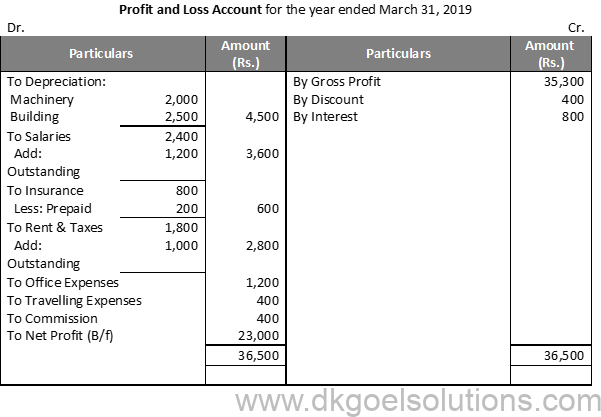
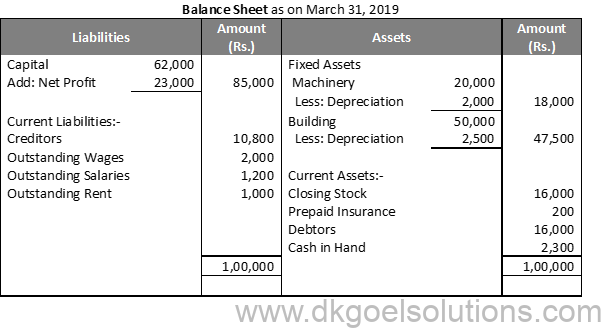
Working Note:-
Depreciation on Building = Rs. 50,000 × 5% = Rs. 2,500
Depreciation on Machinery = Rs. 20,000 × 10% = Rs. 2,000
Question 2:
Solution 2:
Trading Account for the year ended March 31, 2019
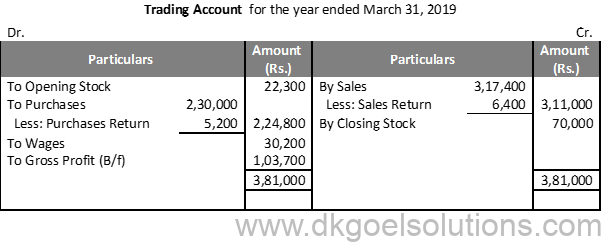

Working Note:-
Depreciation on Freehold Premises = Rs. 1,00,000 × 5% = Rs. 5,000
Depreciation on Office Furniture = Rs. 9,000 × 20% = Rs. 1,800
Interest on Capital = 1,50,000 × 6% = Rs. 9,000
Question 3:
Solution 3:


Working Note:-
Depreciation on Land & Building = Rs. 12,000 × 2.5% = Rs. 300
Depreciation on Motor Vehicles = Rs. 10,000 × 20% = Rs. 2,000
Interest on Capital = 20,000 × 5% = Rs. 1,000
Drawings = Rs. 5,000 + Rs. 4,000 = Rs. 9,000
Question 4:
Solution 4:
Trading Account for the year ended March 31, 2017

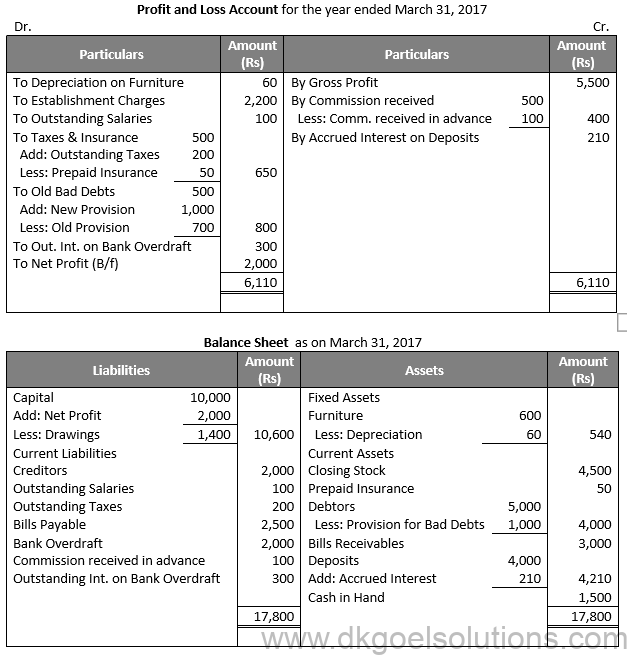
Working Note:-
Depreciation on Furniture = Rs. 600 × 10% = Rs. 60
Question 5:
Solution 5:

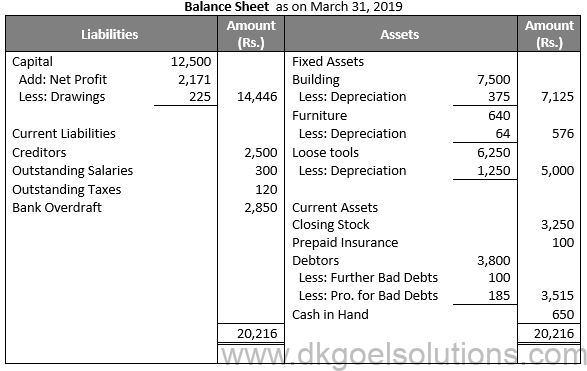
Working Note:-
Depreciation on Building = 7,500 × 5% = Rs. 375
Depreciation on Furniture = 640 × 10% = Rs. 64
Depreciation on Patents = Rs. 6,250 – Rs. 5,000 = Rs. 1,250
Provision for Doubtful Debts = Sundry Debtors – Bad Debts on Furniture × Rate of Provision
Provision for Doubtful Debts = (3,800 – 100) × 5% = 3,700 × 5% = Rs. 185
Question 6:
Solution 6:
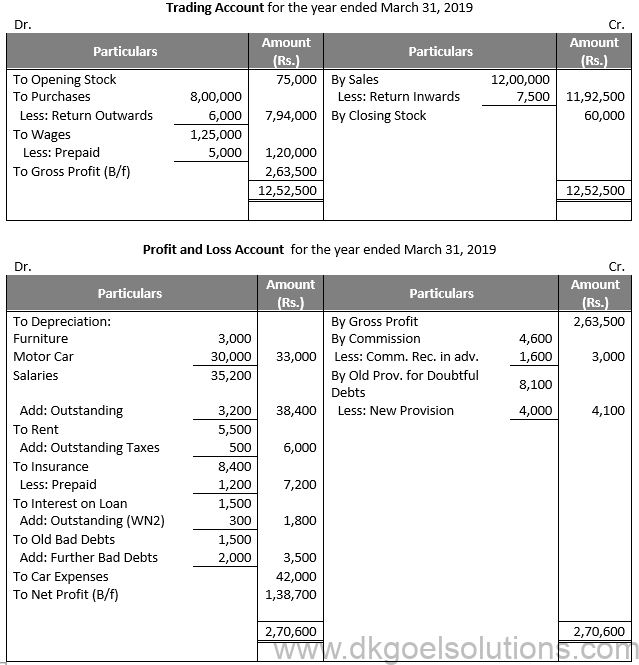
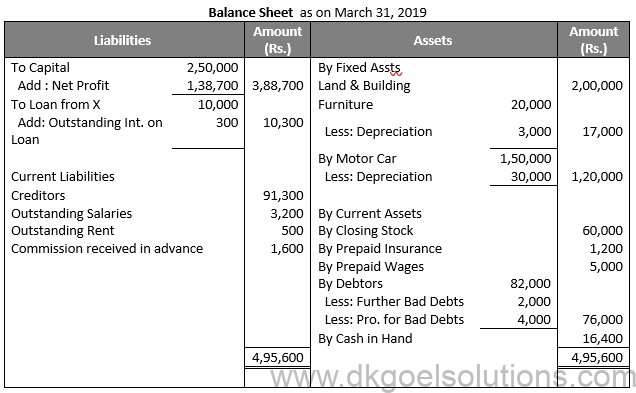
Working Note:-
Depreciation on Furniture = 20,000 × 15% = Rs. 3,000
Depreciation on Motor Car = 1,50,000 × 20% = Rs. 30,000
Provision Doubtful Debts = Sundry Debtors – Further Bad Debts × Rate
Provision Doubtful Debts = 82,000 – 2,000 × 5% = Rs. 4,000
Salaries for 11 months = Rs. 35,200
Salary per month = 35,200/11 = 3,200
Outstanding Salary for one month = 3,200×1 = Rs. 3,200
Rent for 11 months = Rs. 5,500
Outstanding Rent for one month = 5,500/11×1 = Rs. 500
Outstanding Interest on loan = Rs. 10,000 × 18/100 = Rs. 1,800
Total Interest paid = Rs. 1,500
Outstanding Interest = Rs. 1,800 – Rs. 1,500
Outstanding Interest = Rs. 300
Question 7:
Solution 7:

Working Note:-
Provision Doubtful Debts = Sundry Debtors – Further Bad Debts × Rate
Provision Doubtful Debts = 1,02,000 – 2,000 × 5% = Rs. 5,000
Provision for Discount on Debtors = Debtors – Further Bad Debts – Provision for Doubtful Debts × Rate
Provision for Discount on Debtors = 1,02,000 – 2,000 – 5,000 × 2% = Rs. 1,900
Question 8:
Solution 8:


Depreciation on Building = Rs. 1,10,000 × 6% = Rs. 6,600
Provision for doubtful debts = Debtors – Further Bad debts × Rate
Provision for doubtful debts = Rs. 82,000 – Rs. 1,000 × 5% = Rs. 81,000 × 5% = Rs. 4,050
Provision for Discount on Debtors = Debtors – Further Bad Debts – Provision for Doubtful Debts × Rate
Provision for Discount on Debtors = 82,000 – 1,000 – 4,050 × 2% = Rs. 1,539
Question 9:
Solution 9


Working Note:-
Outstanding Interest On bank loan:-
Interest on Bank Loan = Rs. 5,000 × 12% = Rs. 600
Interest charged by bank = Rs. 450
Outstanding Interest = Rs. 600 – Rs. 450 = Rs. 150
Provision for doubtful debts = Sundry Debtors × Rate
Provision for doubtful debts = Rs. 10,500 × 10% = Rs. 1,050
Question 10 (A):
Solution 10 (A):


Working Note:-
Calculation of Drawings = Rs. 58,100 + Rs. 2,800 = Rs. 60,900
Depreciation on Furniture (i) = 58,000 × 10% = 5,800
Depreciation on Furniture (ii) = 5,000 × 10% × 6/12 = 250
Total Depreciation = Rs. 5,800 + Rs. 250 = Rs. 6,050
Outstanding Rent = 10,000 × 2/10 = Rs. 2,000
Calculation of Provision for Doubtful debts:-
Provision for doubtful debts = Sundry Debtors – further Bad debts × Rate
Provision for doubtful debts = (Rs. 2,30,000 – Rs. 30,000) × 5% = Rs. 10,000
Question 10 (B):
Solution 10 (B):


Working Note:-
Depreciation on Plant and Machinery (i) = Rs. 80,000 × 10% = Rs. 8,000
Depreciation on Plant and Machinery (ii) = Rs. 20,000 × 10% × 9/12 = Rs. 9,500
Depreciation on Motor Car = Rs. 70,000 × 20% = Rs. 14,000
Drawings = Rs. 12,000 + Rs. 150 = Rs. 12,150
Question 11:
Solution 11:

Question 12:
Solution 12:

Working Note:-
Calculation of bad debts

Question 13:
Solution 13:

Question 14:
Solution 14:


Working Note:-
Depreciation of Plant and Machinery = Rs. 40,000 × 5% = Rs. 2,000
Depreciation of Furniture and Fixtures = Rs. 1,200 × 5% = Rs. 60
Depreciation on Loose tools = Rs. 3,000 × 15% = Rs. 450
Rent paid for 3 quarters = Rs. 2,700
Rent for a quarter = 2700/3 = Rs. 900
Provision for doubtful debts = Sundry Debtors × Rate
Provision for doubtful debts = Rs. 45,000 × 5%
Provision for doubtful debts = Rs. 2,250
Question 15:
Solution 15:


Working Note:-
Depreciation of Plant and Machinery = Rs. 40,000 × 5% = Rs. 2,000
Depreciation of Building = Rs. 12,000 × 10% = Rs. 1,200
Provision for doubtful debts = Sundry Debtors × Rate
Provision for doubtful debts = Rs. 54,300 × 5% = Rs. 2,715
Provision for doubtful debts = Sundry Debtors – Provision for bad debts × Rate
Provision for doubtful debts = (Rs. 54,300 – Rs. 2,715) × 3% = Rs. 1,548
Question 16:
Solution 16:


Working Note:-
Depreciation of Machinery = Rs. 9,340 × 10% = Rs. 934
Provision for Manager’s Commission = Rs. 9,900 × 10/110 = Rs. 900
Calculation of Provision for Doubtful debts:-:-
Provision for doubtful debts = Sundry Debtors – Provision for bad debts × Rate
Provision for doubtful debts = (Rs. 6,280 – Rs. 160) × 5% = Rs. 306
Question 17 (A):
Solution 17 (A):


Working Note:-
Depreciation of Land and Building = Rs. 2,80,000 × 2.5% = Rs. 7,000
Depreciation of Motor Vehicle = Rs. 50,000 × 20% = Rs. 10,000
Provision for Manager’s Commission = Rs. 2,08,900 – Rs. 62,600
Provision for Manager’s Commission = Rs. 1,46,300
Provision for Manager’s Commission = Rs. 1,46,300 × 10% = Rs. 13,300
Question 17 (B):
Solution 17 (B):


Working Note:-
Depreciation of Plant and Machinery = Rs. 20,000 × 10% = Rs. 2,000
Depreciation of Traveller’s Samples = Rs. 2,700 × 100/300 = Rs. 900
Prepaid Insurance = Rs. 1,200 × 2/12 = Rs. 200
Point in Mind:-
In the event of loss managers are not entitled to get and commission.
Question 18:
Solution 18:
- Capital Expenditure
Reason: Purchases of machinery is a capital expenditure all expenses related to machinery on the purchasing date is treated as capital expenditure. - Capital Expenditure
Reason: Whitewashing on the new building will increase the revenue generating capacity of the building, thus, it will be capitalised and treated as capital expenditure. - Revenue Expenditure
Reason: Annual insurance premium is a recurring expenditure to carry on day-to-day business activities. Thus, it is a revenue expense. - Capital Expenditure
Reason: To enhance the working capacity of the assets if any expenditure is incurred once in a while, then it will be treated as capital expenditure. So, the expenses made on repairing of second hand machinery will be capitalised and treated as capital expenditure. - Revenue Expenditure
Reason: The expenditure on repairing of machinery will help to raise the working capacity of the machinery, so it is revenue expenditure. - Capital Expenditure
Reason: To enhance the working capacity of the assets if any expenditure is incurred once in a while, then it will be treated as capital expenditure. So, the expenses made on air conditioner will be treated as capital expenditure.
Question 19:
Solution 19:


Working Note:-
Depreciation of Machinery = Rs. 14,400 + Rs. 600 × 5% = Rs. 750
Provision for doubtful debts = Sundry Debtors – Further Bad debts – Amount recovered × Rate
Provision for doubtful debts = (Rs. 30,000 – Rs. 500 – Rs. 500) × 5%
Provision for doubtful debts = Rs. 1,450
Question 20:
Solution 20:

Working Note:-
Provision for doubtful debts = Sundry Debtors – Further Bad debts – Amount recovered × Rate
Provision for doubtful debts = (Rs. 4,80,000 – Rs. 15,000 – Rs. 5,000) × 6% = Rs. 27,600
Question 21:
Solution 21:


Working Note:-
Land and Building = Rs. 25,000 + Rs. 3,000 + Rs. 2,000 = Rs. 30,000
Depreciation of Land and Building = Rs. 30,000 × 2.5% = Rs. 750
Depreciation of Plant and Machinery = Rs. 14,470 × 10% = Rs. 1,427
Provision for doubtful debts = Sundry Debtors – Further Bad debts × Rate
Provision for doubtful debts = Rs. 30,000 × 5% = Rs. 1,890
Question 22:
Solution 22


Working Note:-
Depreciation of Land and Building = Rs. 30,000 × 2.5% = Rs. 750
Depreciation of Plant and Machinery = Rs. 14,470 × 10% = Rs. 1,427
Calculation of Provision for Doubtful debts:-
Provision for doubtful debts = Sundry Debtors + Unrecorded sales × Rate
Provision for doubtful debts = (Rs. 3,40,000 + Rs. 15,000) × 5% = Rs. 17,750
Salaries for 10 months = Rs. 80,000
Salaries for 2 months = 80,000/10 × 2 = Rs. 16,000
Question 23:
Solution 23:


Working Note:-
Depreciation of Land and Building = Rs. 40,000 × 10% = Rs. 4,000
Depreciation of Plant and Machinery = Rs. 5,000 × 5% = Rs. 250
Provision for doubtful debts = Sundry Debtors – Sales on Approval × Rate
Provision for doubtful debts = (Rs. 20,600 – Rs. 7,200) × 5% = Rs. 670
Question 24:
Solution 24: Trading Account for the year ended March 31, 2017


Working Note:-
Depreciation of Machinery = Rs. 1,00,000 × 5% = Rs. 5,000
Depreciation of Furniture = Rs. 12,000 × 6% = Rs. 720
Depreciation of Furniture = Rs. 20,000 – Rs. 16,000 = Rs. 4,000
Provision for doubtful debts = Sundry Debtors × Rate
Provision for doubtful debts = Rs. 56,000 × 2% = Rs. 1,120
Question 25:
Solution 25


Question 26:
Solution 26:


Question 27:
Solution 27:


Question 28:
Solution 28:


Question 29:
Solution 29


Working Note:-
Depreciation of Machinery = Rs. 2,00,000 × 15% = Rs. 30,000
Depreciation of Motor Vehicle = Rs. 1,50,000 × 20% = Rs. 30,000
Provision for doubtful debts = Sundry Debtors – future Bad debts × Rate
Provision for doubtful debts = (Rs. 70,000 – Rs. 500) × 1% = Rs. 695
Question 30:
Solution 30:


Working Note:-
Depreciation of Building (i) = Rs. 25,000 × 2.5% = Rs. 625
Depreciation of Building (ii) = Rs. 7,000 × 2% = Rs. 140
Depreciation of office furniture = Rs. 3,500 × 5% = Rs. 175
Provision for doubtful debts = Sundry Debtors – future Bad debts × Rate
Provision for doubtful debts = (Rs. 62,070 – Rs. 570) × 6% = Rs. 3,690
Question 31:
Solution 31:


Working Note:-
Calculation of drawings = Rs. 45,000 + Rs. 5,000 = Rs. 50,000
Depreciation of Building = Rs. 3,00,000 × 5% = Rs. 15,000
Depreciation of Furniture = Rs. 80,000 × 10% = Rs. 8,000
Provision for doubtful debts = Sundry Debtors – future Bad debts × Rate
Provision for doubtful debts = Rs. 2,50,000 × 5% = Rs. 12,500
Question 32:
Solution 32:


Working Note:-
Depreciation of Sales van = Rs. 75,000 × 20% = Rs. 15,000
Depreciation of Furniture = Rs. 10,000 × 15% + Rs. 6,000 × 15% × 3/12 = Rs. 1,725
Provision for doubtful debts = Sundry Debtors – future Bad debts × Rate
Provision for doubtful debts = (Rs. 80,000 – Rs. 2,000) × 5% = Rs. 3,900
Question 33:
Solution 33
Trading Account for the year ended March 3 , 2019


Working Note:-
Depreciation of Sales van = Rs. 15,000 × 20% = Rs. 3,000
Depreciation of Furniture = Rs. 5,000 × 10% = Rs. 500
Depreciation of Machinery = Rs. 15,000 × 10% × 3/12 = Rs. 375
Provision for doubtful debts = Sundry Debtors – future Bad debts × Rate
Provision for doubtful debts = (Rs. 18,200 – Rs. 200) × 5% = Rs. 900
Question 34:
Solution 34:


Working Note:-
Depreciation of Machinery = Rs. 20,000 × 5% = Rs. 1,000
Provision for doubtful debts = Sundry Debtors – future Bad debts × Rate
Provision for doubtful debts = (Rs. 50,000 – Rs. 1,000) × 6% = Rs. 2,910
Provision for doubtful debts = Sundry Debtors – future Bad debts – Pro. For Bad debts × Rate
Provision for doubtful debts = (Rs. 50,000 – Rs. 1,500 – Rs. 2,910) × 5% = Rs. 2,280
Question 35:
Solution 35:


Working Note:-
Depreciation of Plant = Rs. 60,000 × 10% = Rs. 6,000
Depreciation of Furniture = Rs. 15,000 × 20% = Rs. 3,000
Depreciation of Furniture-II = Rs. 5,000 × 20% × 6/12 = Rs. 500
Provision for doubtful debts = Sundry Debtors × Rate
Provision for doubtful debts = Rs. 1,00,000 × 5% = Rs. 5,000
Provision for doubtful debts = Sundry Debtors – Pro. For Bad debts × Rate
Provision for doubtful debts = (Rs. 1,00,000 – Rs. 5,000) × 2% = Rs. 1,900
Question 36:
Solution 36:


Working Note:-
Calculation of Salaries & Wages = 1/4 × 40,000 = Rs. 10,000
Depreciation of Furniture = Rs. 10,000 × 8% × 9/12 = Rs. 1,350
Accrued Interest = Rs. 1,350 – Rs. 900 = Rs. 450
Provision for doubtful debts = Sundry Debtors – Further Bad Debts × Rate
Provision for doubtful debts = (Rs. 73,800 – Rs. 800) × 5% = Rs. 7,300
Question 37:
Solution 37:


Working Note:-
Calculation of Depreciation:-
Depreciation of Plant and Machinery = Rs. 3,80,000 × 10% = Rs. 38,000
Depreciation of Plant and Machinery-II = Rs. 10,000 × 10% × 6/12 = Rs. 500
Depreciation of Fixtures and Furniture = Rs. 12,000 × 20% = Rs. 2,400
Provision for doubtful debts = (Sundry Debtors – Further Bad Debts) × Rate
Provision for doubtful debts = (Rs. 58,000 – Rs. 2,000) × 5% = Rs. 2,800
Question 38:
Solution 38:
Trading Account
for the year ended March 31, 2019


Working Note:-
Depreciation of Motor car = Rs. 2,00,000 × 20% = Rs. 40,000
Depreciation of Fixtures and Furniture = Rs. 8,000 × 10% = Rs. 800
Outstanding Rent = Rs. 7,480 × 1/11 = Rs. 680
Outstanding Wages = Rs. 33,000 × 1/11 = Rs. 3,000
Outstanding Rent = Rs. 30,800 × 1/11 = Rs. 2,800
Question 39:
Solution 39:


Working Note:-
Depreciation of Patents= Rs. 8,000 × 1/5 = Rs. 1,600
Depreciation of Furniture = Rs. 15,000 × 10% = Rs. 1,500
Calculation of Prepaid Insurance = Rs. 1,200 × 6/12 = Rs. 600
Provision for doubtful debts = (Sundry Debtors + Unrecorded – Further Bad Debts) × Rate
Provision for doubtful debts = (Rs. 80,000 + Rs. 12,000 – Rs. 2,000) × 5% = Rs. 4,570
Question 40:
Solution 40:


Working Note:-
Interest on loan = Rs. 20,000 ×15/100 × 10/12 = Rs. 2,500
Interest paid = Rs. 1,500
Outstanding Interest = Rs. 2,500 – Rs. 1,500 = Rs. 1,000
Provision for doubtful debts = (Sundry Debtors – Further Bad Debts) × Rate
Provision for doubtful debts = (Rs. 1,42,000 – Rs. 2,000) × 5% = Rs. 7,000
Advance Rent = Rs. 3,900 × 1/13 = Rs. 300
Question 41:
Solution 41:


Working Note:- (DK Goel Solutions Class 11 Chapter 22)
Depreciation of Premise = Rs. 2,00,000 × 5% = Rs. 10,000
Depreciation of Furniture = Rs. 40,000 × 20% = Rs. 8,000
Depreciation of Packing Machinery = Rs. 60,000 × 10% = Rs. 6,000
Depreciation of Tools = Rs. 15,000 – Rs. 12,000 = Rs. 3,000
Provision for Discount on Debtors = (Sundry Debtors – Further Bad Debts) × Rate
Provision for Discount on Debtors = (Rs. 80,000 + Rs. 1,500) × 2.5% = Rs. 3,250
Question 42:
Solution 42:


Working Note:-
Provision for Doubtful Debts = Sundry Debtors × Rate
Provision for Doubtful Debts = Rs. 40,000 × 5% = Rs. 2,000
Manager’s Commission = Rs. 1,06,000 – Rs. 46,900
Manager’s Commission = Rs. 60,000 × 10% = Rs. 6,000
Question 43:
Solution 43:


Working Note:-
Depreciation of Machinery = Rs. 18,000 × 10% = Rs. 1,800
Depreciation of Machinery = Rs. 12,000 × 10% × 9/12 = Rs. 900
Manager’s Commission = Rs. 50,150 – Rs. 48,350
Manager’s Commission = Rs. 1,800 × 10% = Rs. 180

Here are the reasons why adjustments are essential –
● To calculate the actual net profit or loss of a company.
● To identify the actual financial position of the company.
● To track a transaction that has been eliminated from the accounts.
An outstanding expense depicts a personal account having a credit balance and which is considered as a liability for the companies. As these expenses are treated as liabilities, they are placed in the liability section of the balance sheets. In simple words, outstanding expenses can be defined as unpaid payments or dues that are not yet cleared. For example – Rent due is an outstanding expense.
Accrued income is defined as the outstanding revenue which has been earned but not yet received by a company. It is entered as receivable funds in the accounting books. Examples are – accrued rent to be received, a commission earned to be collected, etc.
Unearned income is the revenue received by a business in the current year. However, the whole income does not come from the current year. Some portion of this fund belongs to the next year and is termed as unearned income. Examples of unearned income are – bond interest, dividends from the stocks, etc.
The financial statements adjustment chapter is one of the most scoring topics in Class 11 Accountancy. With good knowledge and efficient practice, the students can easily score full marks on this topic. Students can refer to the DK Goel Solutions as it helps them comprehend all the concepts and theories of the topic. The solutions are presented in a simple and easy-to-learn manner, which helps the students quickly go through the topic. In Accountancy, understanding must be the primary goal of the students. Dk Goel Solutions helps the students understand all topics and score well in exams.
Provision gets preference when the company’s primary goal is not to strengthen its financial position but to compensate for a loss in business. In this case, provision plays the role of a trump card for businesses.
